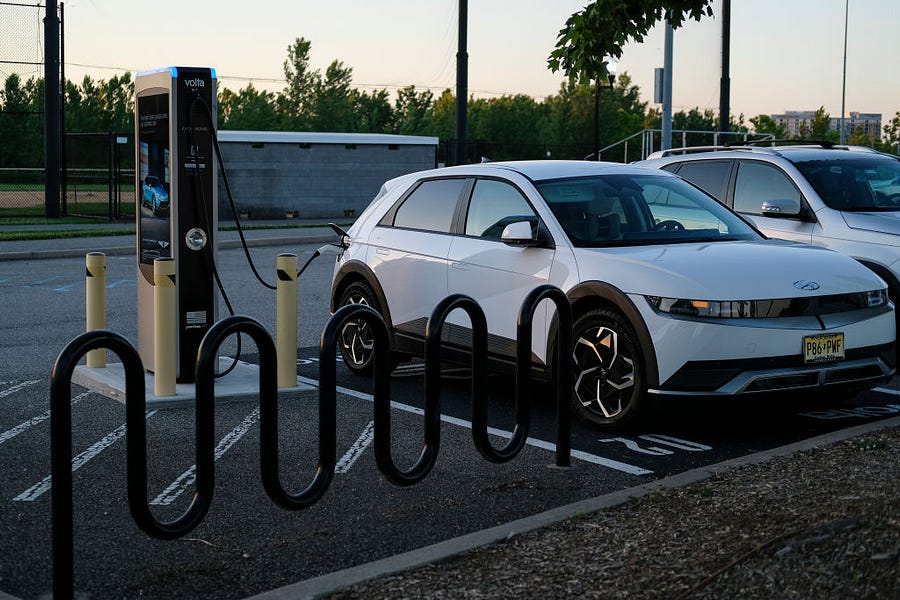Climate change looms large in Democrats’ Inflation Reduction Act, signed into law by President Joe Biden on Tuesday. The legislation will spend $369 billion over the next decade on a portfolio of energy and climate issues, primarily in the form of new and expanded tax credits for both manufacturers and consumers—the largest federal climate investment ever, and much more than the bill’s roughly $80 billion in spending on the IRS and $64 billion for expanded health insurance subsidies ($300 billion in revenue will go toward deficit reduction).
The extent of the spending—which is projected to accelerate America’s ongoing reduction of greenhouse gas emissions—is especially significant given that Americans’ support for government action on climate change is a mile wide and an inch deep. In a Pew poll conducted before the 2020 election, 65 percent of respondents said the federal government was doing too little to combat climate change. But in a July poll from Monmouth University, only 1 percent of respondents named climate change and the environment as “the biggest concern facing your family right now.”
Americans are more concerned about immediate economic realities like inflation, leaving climate policy on the backburner. As a result, liberal commentator Matthew Yglesias argued earlier this year that climate advocacy should be seen as “an elite-driven effort to foist good ideas on a somewhat indifferent public.”
If that’s true, then it’s worth asking: What is the IRA foisting?
Given that Senate Democrats passed the IRA with a simple majority via the budget reconciliation process in order to circumvent the threat of a filibuster, it is unsurprising that no Republican members of Congress voted for the bill. But that doesn’t mean they are inherently opposed to every provision: The Bipartisan Policy Center chronicled at least 25 provisions “associated with bipartisan legislation” from this Congress.
Bob Inglis, a former Republican congressman from South Carolina who served from 1993 to 1999 and again from 2005 to 2011, told The Dispatch that if the expanded tax credits for nuclear, hydrogen, solar, and wind power had been a freestanding bill, “I think there would have been some Republican votes for it.” Compared with progressives, Republicans have been particularly enthusiastic about expanding nuclear power and carbon capture, both of which made it into the bill.
“There are some things that I see as positive in it when it comes to acting on climate, and there are other things that I see as a bit more questionable,” Quill Robinson, vice president of advocacy for the conservative American Conservation Coalition, told The Dispatch.
One policy Robinson has concerns about is the tax credits for electric vehicles (EVs), which he said could subsidize purchases wealthy Americans are already making while doing little to help lower- and middle-income Americans afford EVs.
At the insistence of Democratic Sen. Joe Manchin, the full value of the credit is limited to EVs with a certain percentage of battery components and critical minerals made and sourced in North America. Decreasing reliance on Chinese supply chains is a laudable goal. But it means fewer EV purchases will qualify for the credit. According to the Alliance for Automotive Innovation, 70 percent of EVs are now ineligible for the credit due to the bill’s passage, “and none would qualify for the full credit when additional sourcing requirements go into effect” next year. Congressional Budget Office estimates suggest that “a total of just 237,000 EVs will qualify” in the first five years of the credit. For comparison, General Motors “expects to sell 400,000 EVs by the end of 2023,” according to Reuters.
“The timeline is perhaps overly aggressive in terms of balancing supply chain concerns against the concerns of, we just need to get more EVs out on the road,” said Kristin Eberhard, director of climate policy at the Niskanen Center. “And we need to get them into the hands of people who maybe can’t afford to pay the full upfront cost. If an EV gets on the road, in 2022 or 2023, that’s an extra few years of displacing gas right now that you don’t get if that car only gets on the road in 2025 or 2026. So as we’re trying to reduce our emissions … these early years are critical.”
To make the EV credit more effective at reducing emissions, Eberhard has proposed tying the value of the subsidy to the number of gallons of gas the prospective EV buyer is currently burning. For example, someone with a landscaping business who decides to replace their gas pickup truck with an electric Ford F-150 Lightning would receive a more generous subsidy than an urban Prius driver switching to a Tesla.
Thus far, policymakers haven’t taken Eberhard up on that idea. But the EV credits are just one of several tax credits in the bill, reflecting Manchin’s repeated calls for a “balanced, all-of-the-above” approach which offers clean energy credits to both manufacturers and consumers across a range of clean energy sources and technologies—not just electric vehicles.
Lost in Democrats’ celebrations over the bill’s passage is the fact that Manchin’s deal with Senate Majority Leader Chuck Schumer hasn’t yet been fully realized: The two men’s original agreement calls for comprehensive permitting reform legislation to be passed before the end of the fiscal year.
“Permitting reform is essential to unlocking domestic energy and transmission projects, which will lower costs for consumers and help us meet our long-term emissions goals,” says the Democrats’ one-page summary of the IRA.
Manchin’s permitting reform plan does not have bill text yet. But according to a one-page summary provided by his office, the provisions would, among other things, set a two-year time limit for environmental review for major energy infrastructure projects, an apparent codification of Trump-era regulatory changes. It would also set a new statute of limitations for court challenges to such projects. The plan would also expedite the completion of the Mountain Valley Pipeline—a 300-mile natural gas pipeline from Manchin’s home state of West Virginia to southern Virginia that is currently under construction.
“Even with some of the money in the IRA, that’s not going to solve some of the process problems, and so that permitting bill is really critical,” Eberhard said. “We can build more solar, but if we can’t actually get it to people, then it’s not as effective, and so we need that permitting piece to get the transmission infrastructure built.”
James Coleman, a senior fellow at the American Enterprise Institute, shared a similar sentiment in a blog post last week.
“The strange thing about this huge spending on new energy sources is that high energy prices already promise financial rewards to anyone who can build the new energy infrastructure America needs for more reliable, affordable, and secure energy supplies,” he wrote. “Unfortunately, these power-lines, pipelines, and clean energy projects are being held up by our sluggish permitting system. To put its new spending to good use, Congress must adopt permitting reforms that will make it easier to build America’s future energy system.”
Because the rules surrounding the budget reconciliation process preclude these permitting reforms, Congress will have to pass such legislation as a separate bill. To get there, Manchin will have to navigate between Republicans—who have supported permitting reform in the very recent past but may be more hesitant now that it is politically tied to a Democratic bill—and progressives, who are disgruntled that it would make fossil fuel projects easier to complete.
Tax credits and permitting reform only affect American companies. To really make a dent in global emissions, foreign producers need to curb their emissions too, Inglis said.
“Let’s keep going and figure a way to get the whole world in on climate action,” he said. “You can’t incentivize Chinese corporations with the American tax code.”
To push foreign corporations in a more climate-friendly direction, Inglis would prefer a carbon tax paired with a carbon border adjustment, charging Chinese companies for the carbon content in products imported to the United States.
But the political and policy constraints on emissions-reducing trade policy—both at home and abroad—are challenging. The political appetite for a carbon tax within the United States is almost nonexistent. In many ways, the IRA represents a rejection of a stick-based approach in favor of more carrots. And without a carbon tax at home, border adjustments would likely be deemed impermissible tariffs by the World Trade Organization.
“We’re going to have to look at this in a much more realist lens and figure out how we can advance our energy security, economic security, and climate security goals together,” Robinson said, “rather than trying to rally the world in a sort of a Wilsonian approach around this shared challenge of climate change.”
In the narrowly divided Senate of 2022, it was Manchin, not Bernie Sanders, who ended up dictating the terms of the most significant climate legislation in American history. A similar dynamic will likely persist into the next Congress. Moderate members—or at least compromise-inclined senators—will determine whether further climate policy changes will have a shot at becoming law during the Biden administration.






Please note that we at The Dispatch hold ourselves, our work, and our commenters to a higher standard than other places on the internet. We welcome comments that foster genuine debate or discussion—including comments critical of us or our work—but responses that include ad hominem attacks on fellow Dispatch members or are intended to stoke fear and anger may be moderated.
With your membership, you only have the ability to comment on The Morning Dispatch articles. Consider upgrading to join the conversation everywhere.